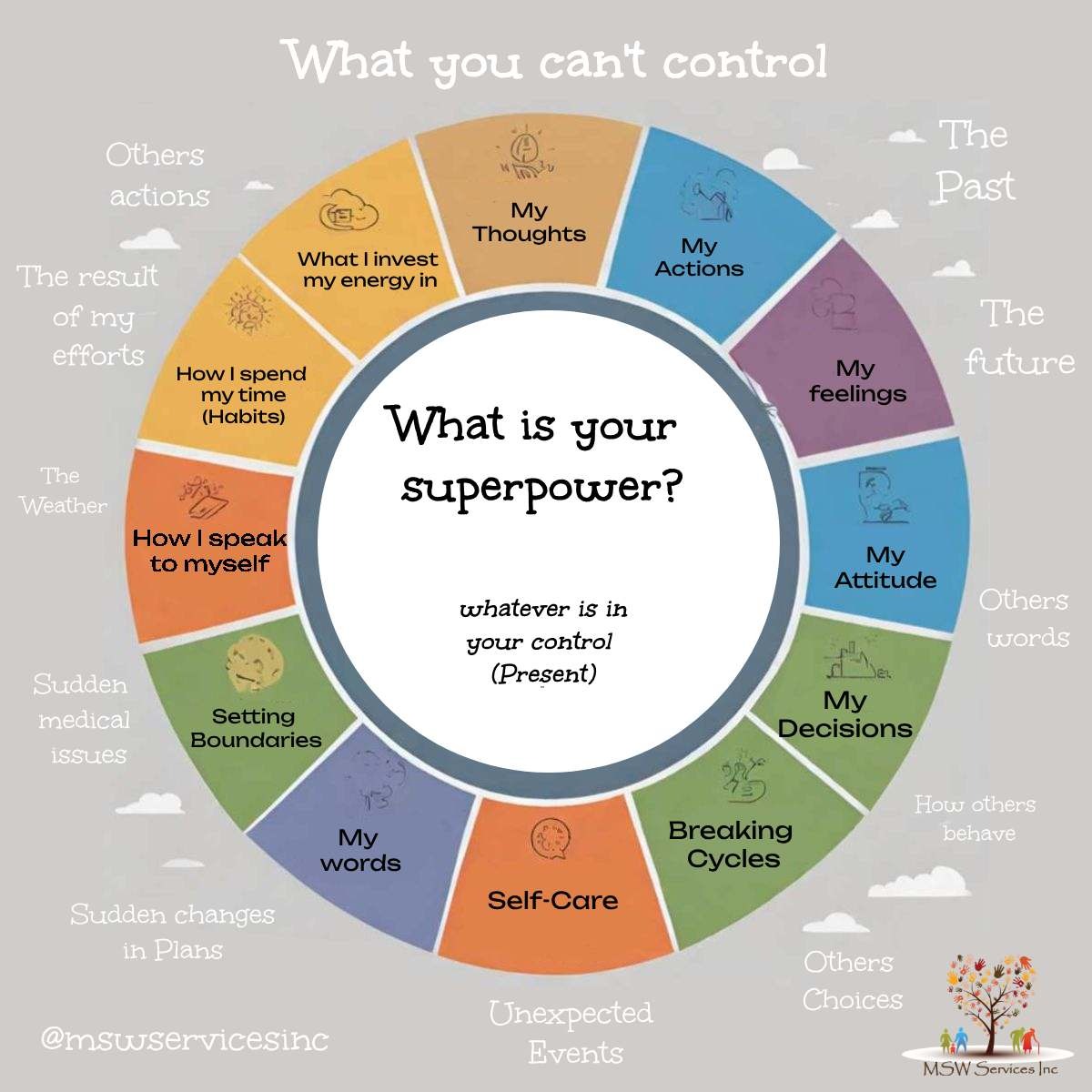
As we approach 2024, many of us make resolutions, often related to physical health, career goals or personal aspirations. But let’s turn our focus inward this year and explore our mental health – an area where we hold immense power over thoughts, actions, feelings attitudes decisions and more. By understanding and harnessing these aspects we can break negative cycles practice self-care set healthy boundaries invest our energy wisely.
At times, we may find ourselves dwelling on the past, worrying about the future, or focusing on others’ actions and unforeseen events. However, all these elements are beyond our control. The more time you spend fixated on what you can’t control, the further you drift from your true superpower. Taking 100% responsibility means recognizing that you do have control; you possess a superpower, and it’s essential to determine which areas you need to empower.
Look at the list below and rate each aspect from 0 to 5 — where 0 is lacking and 5 is fully charged. You can continue to enhance your strengths, those areas that are supercharged, or you can begin to work on empowering your weaker areas.
To make this process engaging and structured, let’s identify 12 ‘mental health super powers’—one for each month of the year. This approach allows us to focus on and develop a specific aspect of our mental well-being each month, culminating in a year of significant personal growth and empowerment.
Discovering Your Mental Health SuperPower:

1. “What I invest my energy in”– Be mindful where and how you invest your energy. Engaging in positive activities and surrounding yourself with supportive people can uplift your spirit.
Where do I most frequently direct my energy each day, and how does this align with my personal values and goals?
Which activities or people in my life energize me, and which ones drain me?
How does the way I invest my energy impact my emotional and mental well-being?
What changes can I make to invest more energy in activities and relationships that are fulfilling and nurturing?
Am I investing enough energy in self-care and personal growth, and if not, what can I do to improve this?
2. “How I take care of myself”– Allowing time for yourself isn’t selfish-it’s essential! From taking relaxing baths and nature walks to engaging in favorite hobbies and other forms of self-renewal activities, prioritize activities that rejuvenate you to ensure optimal wellness.
What daily or weekly self-care practices do I currently have in place, and how effective are they in enhancing my well-being?
When I feel stressed or overwhelmed, what are my go-to strategies for self-soothing and recovery?
How do I balance taking care of others with taking care of myself, and where can I improve this balance?
3. “I have control of My thoughts”– Thoughts play a powerful role in our emotional state and behavior. We cannot control every single thought we have but by cultivating a positive mindset and attitude, we can more successfully face life’s challenges.
When I am upset what is the narrative I am telling myself?
How often do my thoughts align with reality, and how can I distinguish between irrational fears and valid concerns?
In challenging situations, how can I reframe my thoughts to focus on potential positive outcomes or learning opportunities?
How do my recurring thoughts impact my daily life, relationships, and overall well-being?
4. “I have control of My feelings”– Working on emotional self-regulation is vital for well-being. It involves acknowledging and understanding your emotions, not suppressing them. Whether it’s through deep breathing, mindfulness meditation, or journaling, finding healthy outlets for emotions is crucial. Regular practice of these techniques can lead to a more balanced and fulfilling emotional life.
What are the common triggers that lead to intense emotional responses in me?
How do my emotions manifest physically in my body, and what are the signs that an emotional response is beginning?
How do I typically react when experiencing strong emotions, and what are healthier alternatives to these reactions?
What coping strategies work best for me in managing difficult emotions, and how can I make them a regular part of my routine?
How can I practice self-compassion and kindness towards myself, especially when dealing with challenging emotions?
What can my emotions teach me about my needs, boundaries, and values?
5. “I have control of My Actions”- Being mindful of your actions is a key step towards self-empowerment and personal growth. It’s about making conscious choices that align with your values and goals. Whether it’s pursuing meaningful activities, setting boundaries, or practicing self-discipline, intentional actions create a life that reflects your true self and aspirations
Am I making intentional actions or are they mainly reactions of my daily life?
How can I ensure that my daily actions align with my long-term goals and values?
Which of my current habits are beneficial, and which ones do I need to change or eliminate?
What strategies can I use to strengthen my self-discipline, especially in challenging situations?
How can I constructively reflect on past actions that didn’t yield the desired results, and what can I learn from them?
6. The power of words– How I speak to myself- our internal dialogue matters! Be kind and compassionate in how you talk to yourself. Replace negative thoughts with affirmations statements and positive statements for optimal health.
What daily or weekly self-care practices do I currently have in place, and how effective are they in enhancing my well-being?
When I feel stressed or overwhelmed, what are my go-to strategies for self-soothing and recovery?
How do I balance taking care of others with taking care of myself, and where can I improve this balance?
Do I regularly check in with myself to understand my needs and feelings, and how can I make this a more consistent practice?
7. My Attitude- Having a positive attitude is like a superpower for your mental health, helping you stay strong and upbeat even when things get tough. Though you cannot control every event that happens to us in life, what you can control is how we interpret those events.
Does my attitude aligns with and supports my personal and professional goals?
How am l dealing with negative thoughts or attitudes?
What is the nature of my internal self-talk, and how can I make it more positive and supportive?
How does my attitude impact my interactions with others and my daily experiences?
8. Setting Boundaries- Establishing boundaries can be essential to mental wellbeing, helping reduce stress levels and build healthy relationships.
Do I say yes to others because I can say no?
Am I a people’s pleaser?
What are my current boundaries, and how effectively am I communicating and enforcing them?
In which areas of my life do I feel the need to establish stronger boundaries?
9. Breaking cycles- Recognizing harmful patterns in your life is critical, because once identified they give you the power to break them and create healthier habits.
Have you noticed a negative pattern in your behavior or thoughts? What situation do they typically arise?
Are you usually trying to please others and have a hard time saying no!
How do these patterns align or conflict with the person I aspire to be or the life I want to lead?
10. The Power of Words– How I speak to others-
In what ways do I use words to uplift others, and how often do I engage in this practice?
Can I identify instances where my words may have unintentionally hurt someone, and what did I learn from those experiences?
Am I listening to the conversation or just reacting to a comment?
11. How I spend my time and develop positive Habits– Your choice in how you spend your time can have an enormous impact on your mental wellbeing. Prioritise activities that bring joy and fulfillment over those which sap energy from you. Creating habits that promote both mental and physical well-being can have profound effects on your mood and energy levels.
How much time do I actually spend on various activities throughout the day, and does this reflect my stated priorities?
Do these activities bring me happiness? Are they adding value and meaning to my life, or simply taking away from it?
How much of my time is spent doing things I enjoy versus things I feel obligated to do?
Which of my current habits have the most significant impact on my daily life and overall well-being?
12. “My decisions”– Every decision we take have an effect on our lives, so choose decisions that align with your values and goals, while prioritizing those which support mental wellbeing.
Be Patient and Kind to Yourself: Change can take time; be kind to yourself during this journey by being understanding of setbacks as part of the experience.
Conclusion As we welcome in 2024, let’s embrace our mental health ‘super power.’ By being more aware of our thoughts, actions, feelings and how we use our time and energy, we can set realistic goals to foster healthier minds and achieve an improved state of being. Remember: the journey toward improved mental wellbeing is ongoing – let this year be filled with growth, self-discovery and empowerment!



